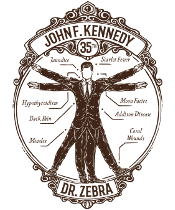

Health and Medical History of President
Chester ArthurLived 1829-1886
Health and Medical History of President
Chester ArthurLived 1829-1886
1776-1783
1812-1815
1846-1848
1861-1865
1898-1899
1917-1918
1941-1945
1950-1953
1964-1975
1990-1991
2001-2021

As President, he "pursued a lavish social life, entertaining ... friends smoking, drinking, and conversing. It was said that no human being could withstand the stress produced by such socializing combined with the extreme pressures of his official office" 1a.
Despite his appetites and his being a widower President, "his personal life was impeccable" 2a.
New York specialists examined the President, but all they could do was advise rest and relaxation 1a.
A cover-up began. When the New York Herald reported the story, an Arthur spokesman specifically denied the President had Bright's disease or any kidney complaints. The spokesman claimed the President had a mild form of malaria 1c (then endemic in Washington DC).
In the winter of 1883-1884, "his associates noted that late at night while socializing his face was lined, his eyes dulled, and his mind much less acute than it had been" 1a.
His last months were miserable. He was recognized as having cardiac problems in early 1886. The symptoms were those of heart failure: dyspnea, orthopnea, edema, cachexia. He needed opiates to sleep. In June 1886 Arthur tried relocating from New York to the cooler climate of Connecticut, but found no relief. He returned to New York and told a friend "After all, life is not worth living. I might as well give up the struggle for it now as at any other time and submit to the inevitable" 1d.
Comment: His terminal symptoms are also consistent with end-stage renal disease. It would be interesting to know more about his mental status during these final months.
- There is no record of any significant illness during Arthur's childhood or youth 1b.
- "The President was accustomed to retire very late, and sometimes the day would be pretty well advanced before he would get his breakfast. He gave a great many swell dinner parties, and the guests used to enjoy themselves hugely. He generally attended the church right across from the White House, St. John's Episcopal Church. Often in good weather he would walk over and walk back; if it were disagreeable, he would have the carriage ordered and go over in that." 4a
- Arthur demonstrated as President that he was above factions within the Republican Party, if indeed not above the party itself. Moreover, as a long-time beneficiary of the corrupt "spoils" civil service system, Arthur astonished by reforming it. All in all, Arthur as President exceeded expectations. One wonders if knowing he had a terminal condition helped Arthur rise above the limitations of his pre-morbid character.
- Bumgarner, John R. The Health of the Presidents: The 41 United States Presidents Through 1993 from a Physician's Point of View. Jefferson, NC: MacFarland & Company, 1994.
 a p.132 b p.131 c p.133 d p.134 e pp.133-134
a p.132 b p.131 c p.133 d p.134 e pp.133-134Comment: Devotes one chapter to each President, through Clinton. Written for the layperson, well-referenced, with areas of speculation clearly identified, Dr. Zebra depends heavily on this book. Dr. Bumgarner survived the Bataan Death March and has written an unforgettable book casting a physician's eye on that experience.
- Montgomery-Massingberd, Hugh (ed). Burke's Presidential Families of the United States of America. 2nd ed. London: Burke's Peerage Limited, 1981.
 a p.354 b p.356
a p.354 b p.356Comment: Maps -- in great detail -- the ancestors and descendants of American presidents through Ronald Reagan. They would have had an exhausting time with President Obama's family tree! MORE
- Dugan, James. Bedlam in the boudoir. Colliers. 22 Feb. 1947; pages 17, 69-70.
Comment: Credibility is dubious. Just before a list of Presidents, the article states: "Twenty of the 32 Presidents ... are proved or believed on a thick web of circumstance to have been nocturnal nuisances in the White House."
- Pendel, Thomas F. Thirty-Six Years in the White House. Washington: Neale Publishing Company, 1902.
 a p.128
a p.128Comment: Pendel was door-keeper at the White House from the time of Lincoln to the time of Theodore Roosevelt. Full text is available on-line at loc.gov. It is a rather dry book, and reads as if it were written by an old man. http://memory.loc.gov/cgi-bin/query/D?lhbcbbib:1:./temp/~~ammem_rEou::









